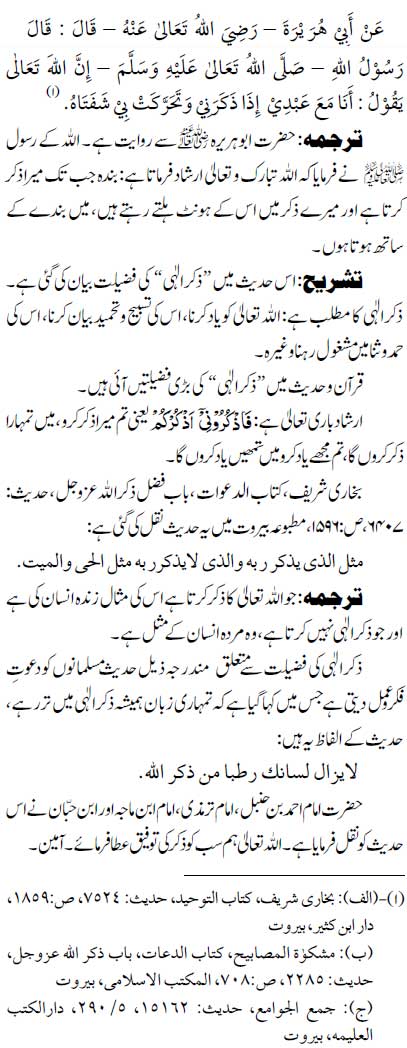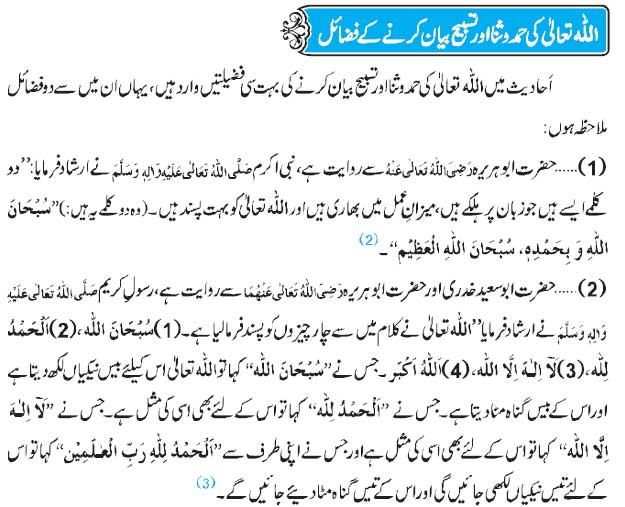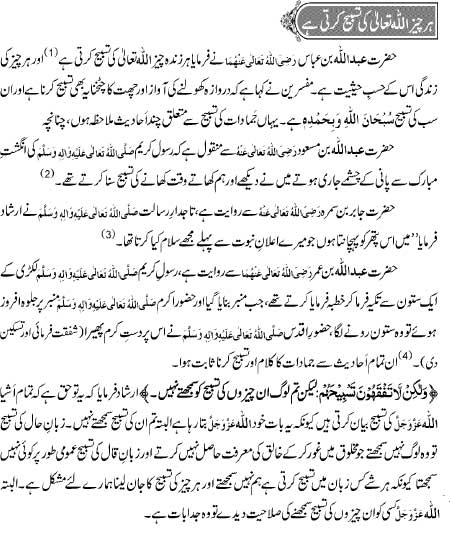
Tasbeehat Hazrat Fatima Zahra (RA)
TAG: Tasbeeh
Fajr Ki Namaz Parhne Walo Kay Liay Deedar-e-Elahi Ka Inaam

Fajr Ki Namaz Parhne Walo Kay Liay Deedar-e-Elahi Ka Inaam
Tasbeeh And Takbeer Are Among The Delights Of The People Of Paradise
Paradise is the abode of reward and delight, not of trials and testing. A problem might arise concerning the hadith reported by al-Bukhaari and others from Abu Hurayrah, according to which the Prophet (saw) described the first group to enter Paradise and said, “They will glorify Allah (SWT) morning and evening.” [Saheeh al-Bukhaari, Kitaab Bid’ al-Khalq, Baab maa jaa’a fi Sifaat al-Jannah, Fath al-Baari, 6/318]
But there is nothing problematic in this report, insha’Allah, because, as al-Qurtubee said “This Tasbeeh is not the matter of obligation or imposition.” As was reported by Muslims, Jaabir explained it as follows, “They will be inspired with Tasbeeh and Takbeer as they are inspired with breathing.” The analogy of breathing was used because it is something man does with no conscious effort. Their breathing will become Tasbeeh, and the reason for this is that their hearts will be illuminated with the knowledge of their Rabb, may He be glorified, and filled with love for Him, and whoever loves a thing remembers it frequently.” [Fath al-Baari, 6/326]
Shaykh al-Islaam Ibn Taymiyyah stated that this Tasbeeh and Takbeer will be one of the pleasures enjoyed by the people of Paradise. He said, “This is not the kind of obligatory work that is done for the sake of a specific reward. It is the same as the kind of deeds that people do for pleasure and enjoyment.” [Majmu’ Fataawa, 4/330]
- May, 22
- 4003
- Paradise-Hell
- More
Hadith Qudsi: Zikr-e-Elahi Ki Fazeelat

Hadith Qudsi: Zikr-e-Elahi Ki Fazeelat
Allah Ki Hamd-o-Sana Kay Fazail

Salatul Tasbeeh Ki Fazeelat

Allah Ki Tasbeeh

Common Errors In Prayer That Must Be Avoided
Listed below are the 6 Common mistakes usually we make in prayers
Mistake 1: Reciting Surat al-Fatiha fast without pausing after each verse.
The Prophet (SAW) used to pause after each verse of this surah. (Abu Dawood)
Mistake 2: Sticking the arms to the sides of the body, in rukoo’ or sujood, and sticking the belly to the thighs in sujood.
The Messenger of Allah (SAW) said: ‘Let not one of you support himself on his forearms (in sujood) like the dog. Let him rest on his palms and keep his elbows away from his body.’ (Sahih Muslim). The Messenger of Allah (SAW) used to keep his arms away from his body during rukoo’ and sujood that the whiteness of his armpits could be seen (Sahih Muslim).
Mistake 3: Gazing upward during prayer.
This may cause loss of concentration. We are commanded to lower our gaze, and look at the point at which the head rests during sujood. The Prophet (SAW) warned: ‘Let those who raise their gaze up during prayer stop doing so, or else their sights would not return to them. i.e. lose their eyesight].’ (Muslim)
Mistake 4 : Resting only the tip of the head on the floor during sujood.
The Prophet (SAW) said: ‘I am commanded to prostrate on seven bones the forehead and the nose, the two hands [palms], the two knees, and the two feet.’ (Sahih Muslim) Applying the above command necessitates resting the forehead and the nose on the ground during sujood.
Warding Off Distractions In Prayer
Allah has specified the qualities of successful believers who will inherit the Highest Paradise, Jannah Al-Firdous, in the Qur’an. One of them is Khushoo’.
“Successful indeed are the believers. Those who offer their Salat (prayers) with all solemnity and full submissiveness (Khushoo’).” (Qur’an, 23:1,2)
The term ‘Salah’, is derived from the root word ‘Silh’ which means connection i.e. the connection between us and Allah.
The Messenger of Allah (peace be upon him) said, “When anyone of you stands for prayer, he is conversing with his Rabb, so let him pay attention to how he speaks to Him.” (Al-Hakim, Al Mustadrak, 1/236; Sahih Al-Jami’ no.1538)
Consider three types of houses:
• A king’s house: filled with treasures, but with guards on all four corners.
• A haunted house, which is very dark.
• A common man’s house: filled with his savings and treasure.
Now, if a thief comes to steal from one of the three houses which one will he choose? Obviously, the house of the common man because it has something of value and is not guarded.
This is the example of our hearts. The first is similar to the hearts of prophets i.e. well-guarded, the second is the heart of those who don’t believe in Allah as He deserves, and the third is similar to the heart of common believer like you and me. This is why Shaitan attacks our hearts and that’s why we sometimes find ourselves praying with Khushoo’ and sometimes not.
Solution
The Prophet (peace be upon him) has asked us to seek refuge in Allah from Satan.
Abul Aas once asked, “O Messenger of Allah (peace be upon him), the Shaitan interrupts me when I pray, and I get confused in my recitation.” The Prophet (peace be upon him) said, “That is Shaitan (whose name) is Khanzab. If you sense his presence, seek refuge with Allah from him (i.e. say A’oodhu billaahi min-ash-Shaitaan-ir-rajeem), and spit (dry spitting) towards your left three times.” Abul Aas said: “I did that and Allah took him away from me.” (Sahih Muslim, no. 2203)
Apart from this, try to prepare for Salah in advance. Have Wudhu before the Adhan. Answer the Adhan and say the Du’a the Prophet (peace be upon him) taught us to say after hearing the Adhan. Go to the mosque in advance. Avoid unnecessary talk before prayer, instead try to be busy with Tasbeeh and Istighfar. When you’re praying at home, recite different Surahs and not just the smallest ones you keep repeating all the time.
And most importantly think about the greatness of Who you are going to stand in front of in prayer.

